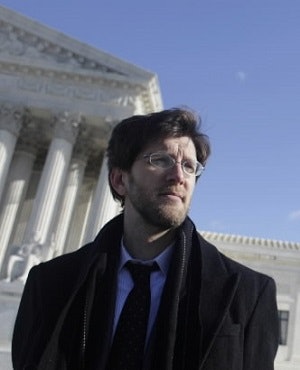Three weeks before the fall semester, Simon Sandoval-Moshenberg prepared a lecture for George Mason University law students on the structure of the U.S. immigration system. He’s the director of the Immigrant Advocacy Program at the Legal Aid Justice Center, a nonprofit that offers legal services to low-income Virginians.
By the time he taught his first class, the system’s structure was on the cusp of change. The Department of Justice had proposed a new set of regulations.
“Things that have been true for the 11 years I’ve been in practice aren’t true anymore,” Sandoval-Moshenberg said. “You can’t recycle last year’s lesson plan. That’s for sure.”
 Simon Sandoval-Moshenberg
Simon Sandoval-MoshenbergSandoval-Moshenberg is a co-teacher at the new Immigration Litigation Clinic at George Mason University’s Antonin Scalia Law School, a collaboration between George Mason University and the Legal Aid Justice Center. Over the course of a year-long program, the clinic will give six George Mason law students an in-depth, hands-on experience where they’ll represent clients facing deportation. The program opened this fall.
Becky Wolozin, co-teacher and director of the Immigration Litigation Clinic, emphasized that the new initiative will be a benefit to both law students and local immigrants in need of legal help.
“There’s a real shortage of representation in immigration,” she said. “Having clinics where students can provide services and also potentially learn and hone their craft and go on to work on behalf of immigrants after law school is a really important thing.”
As a law student at Harvard University, Wolozin participated in clinics and “loved it,” she said. Clinic work enabled her “to have a connection to real people, to clients, and to feel like I was able, even in my small way, to materially make their lives better and get them through whatever legal issues they were facing.”
Her time working in clinics became “a real motivator for why I do what I do,” she said. Now, she wants that for her students.
“I hope students in the clinic will find the same satisfaction helping clients in the way that I have in my own experiences and will let that carry them forward in their career,” she said.
Her organization, the Legal Aid Justice Center, also operates clinics at the University of Virginia Law School and the University of Richmond Law School. But the Immigration Litigation Clinic is a first for George Mason University, funded by a donation from alumni Leonard A. Bennett, who graduated from George Mason University and George Mason University School of Law.
“I am so grateful to Len Bennett for his generous gift, making the new Immigration Litigation Clinic possible,” said Dr. Henry N. Butler, dean of the Antonin Scalia Law School, in a statement. “Len’s philanthropy will profoundly impact our students and the clients they serve.”
 Becky Wolozin
Becky WolozinButler also praised the Legal Aid Justice Center for giving students “first-hand experience advocating for immigrant families.”
“We are proud to educate students who will become lawyers committed to justice for all,” he said.
Students participating in the clinic will attend a two-hour seminar each week about a range of immigration issues including: asylum, protection for crime victims, issues around detention and bond, and interviewing skills. Meanwhile, they’ll be juggling individual cases and federal cases related to “cutting-edge” topics in immigrant rights, Sandoval-Moshenberg said.
For example, he and Wolozin are looking into having students work on a case challenging the government’s announcement about ending Medical Deferred Action, a program that allows immigrants with life-threatening conditions to extend their stay.
One of the goals is for students to leave the clinic knowing “how to go from reading about a particular policy change in the newspaper to working on a lawsuit – and litigating a lawsuit – to actually challenge and potentially overturn that policy change,” Sandoval-Moshenberg said.
The Immigration Litigation Center is opening at an interesting time, Sandoval Moshenberg said. While immigration law has always been fluid, under the Trump administration, regulations are constantly in flux, making it “very difficult” to advise clients. For homework, students are reading judicial opinions from as recent as three months ago.
“One of the most frustrating things about being an immigration lawyer these days is how fast things change – and it never seems to be to the benefit of the immigrant,” Sandoval-Moshenberg said. But he hopes students will “learn from the chaos,” keeping up-to-date on the latest developments to serve their clients.
“What they get out of the clinic is not a snapshot of what the world looked like in 2019, but rather the tools with which to keep current with the world as it continues to change,” he said.
Wolozin sees the current political moment as an “exciting time for students” at George Mason’s Immigration Litigation Clinic, as challenging as it may be.
“There are so many moving parts and they have to learn to react very quickly,” she said. Right now, “having a lawyer can really make a difference in somebody’s life and they get to be that difference.”
Sara Weissman can be reached at [email protected].



















